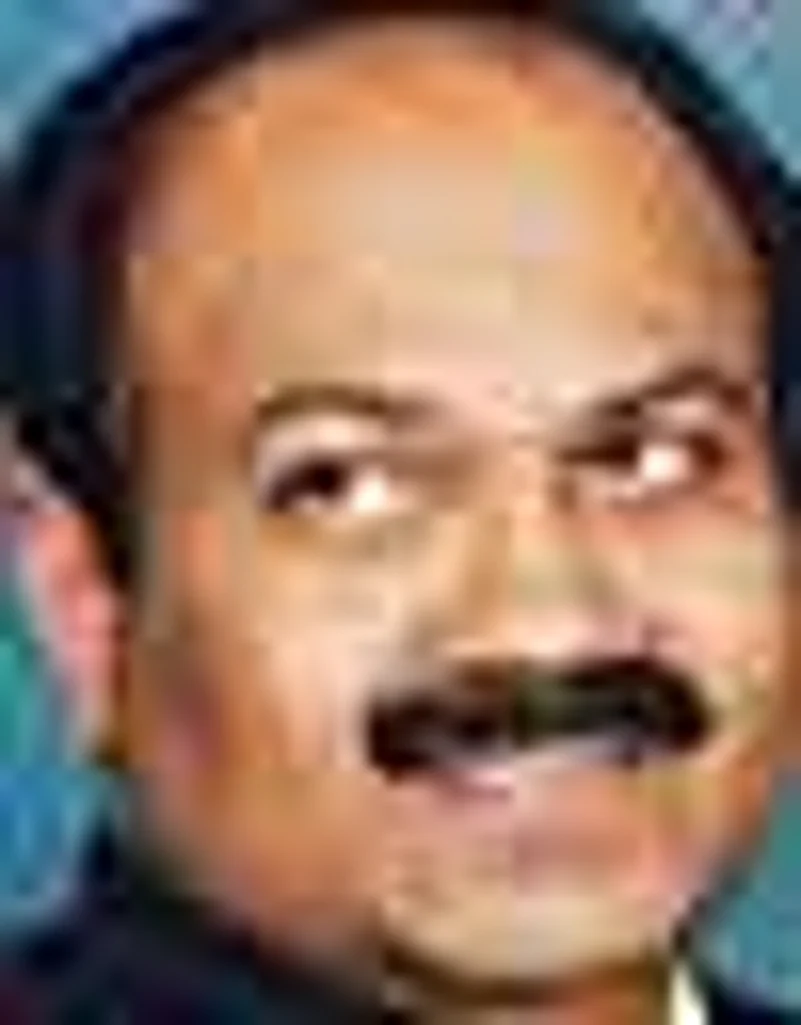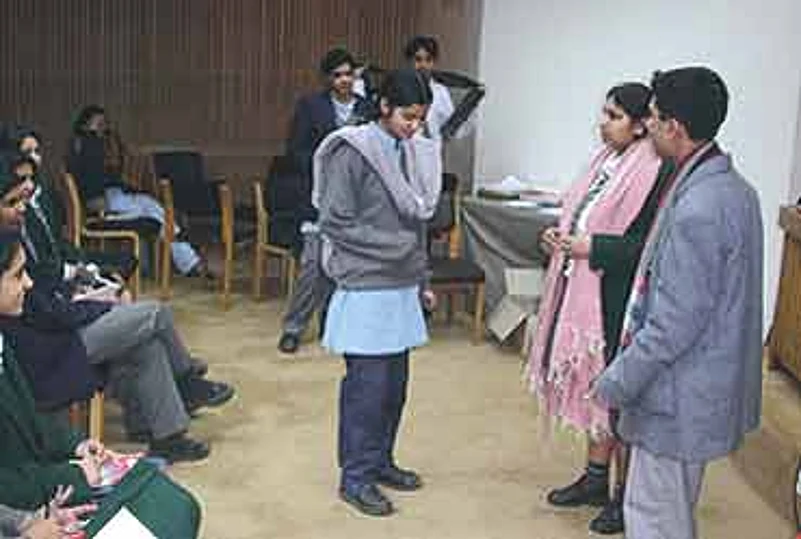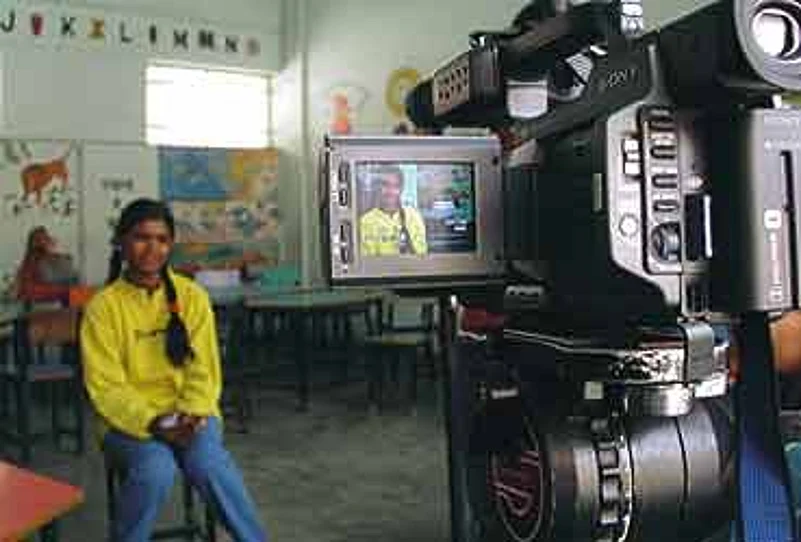97% Delhi girls (77% of all teens) believe gir ls don’t get pregnant if a boy doesn’t ejaculate inside her (withdrawal is unreliable). 29% of all surveyed think only gays and sex workers can get HIV.
77% of Delhi boys (54% of all boys; 23% of all girls) believe masturbation makes you weak. 59% of teenagers think menstruation is the body's way to expel unclean blood.
85% of Delhi boys (56% of all boys; 15% of all girls) hold the size of the penis as a measure of masculinity. Only 27% of Calcutta boys and 12% of Chennai girls think this attribute matters.
70% of Delhi boys (38% of all boys; 12% of all girls) say boys get a stomach ache after ejaculation. Just 15% of Chennai boys and 3% of Chennai girls believe this happens.
79% of Chennai girls (and 21% of all teenagers surveyed) think that condoms are not enough to prevent the spread of sexually transmitted diseases.

Meenakshi Nayar, Sex Educator, New Delhi
"When we approach them with our workshop, the common excuse in schools is parents will object. But 90% of parents say yes to it."

R. Kishore Kumar, Senior principal, St. John’s International Residential School, Chennai
"A residential school has bigger responsibilities than a day-school. Sex education should be dealt with from class 9."

Manisha Malhotra, Trainer, Shri Ram School, New Delhi
"They are like the moral police—teachers are so inhibited that they are embarrassed to teach even routine biology lessons."

Venu Arora, Filmmaker, New Delhi
"Puberty has come forward, marriage has been pushed back. It would be naive to expect youngsters to postpone sexual experiences."
- 53 per cent of 8th standard students from urban English medium schools in Bangalore believe that a baby is born naturally through a mother’s navel or stomach, said a study in the March 2003 issue of the Indian Journal of Paediatrics.
- Slightly older adolescents in Delhi from similar schools have regular consensual sex, often with multiple partners, according to studies conducted by Expressions, the school-based value education tracker.
- Last month, two 8th standard boys in Mumbai tried to molest a 1st standard girl in their school. Counsellors say such ham-handed efforts to explore sexuality are on the up everywhere.
- Two to three cases of teenage pregnancies a month amongst elite school girls is common. "Now, of these families are really wealthy and discreetly fly abroad if the pregnancy is advanced, giving the children to adoption agencies on return," reveals Jitender Nagpal of VIMHANS.
- Manjula Lal, author of a rare book on sex education for adolescents called the I-file, writes: "A study in a hospital in one of our small towns found that out of 100 girls who came seeking abortion, 80 did not know that sexual intercourse could lead to pregnancy. Ninety did not know about contraception."
There are probably more sexually active adolescents around us than we could ever imagine.The exclusive Outlook -Synovate survey of 13- to 17-year-old schoolchildren in Chennai, Delhi, Calcutta and Bombay throws up alarming concerns about the state of sexual health education in the country, the extent of sexual activity, and most worrying, the level of ignorance of the nature, safety and consequences of such activity.Given that the study focused on the most privileged children in these cities, its findings would clearly call for a thorough overhaul of the way we teach our children about the facts of life.But why are schools reluctant? "Most schools, parents and teachers are scared to acknowledge that our kids are sexual beings," says Brother Christopher, principal, St Columbas’ School, Delhi".Also there are so many other problems that schools must intervene with things such as dysfunctional homes and anger management that it gets pushed down the list of priorities," says Abha Sood Adams, director, Shri Ram School, which is one of the few Delhi schools that have a clear policy on sexual health education. While most schools are steeped in the notion that exposure to such information encourages sexual activity, adolescents laugh it off. "What sex education? Our teachers are from the last century, we can teach them a thing or two," sniggers Rishabh, a ninth standard student from Delhi.
But schools still in doubt should read the chapter on Sex Education in the Indian Encyclopedia of Education (NCERT, 2004). Authors of this chapter Jitender Nagpal and Divya Prasad explain: "Research has shown that learning about sex means that children are less vulnerable and are able to make more informed, responsible decisions about their relationships and sexual behaviour."
Yet most schools hide behind parents when they want to avoid the subject of sexual health. Says Ratnesh Mathur of Genie Kids, Bangalore: "The problem is that while schools believe that the onus lies on parents, parents think schools should do something." The child is caught in the middle. Says Meenakshi Nayar, a Delhi-based special educator in the field of sexuality, "When we approach schools with our workshop, the most common excuse is that parents might object, however when I have directly written to parents, 90 per cent have said yes to it."
For Manjit Batra, principal, City Montessori School, a co-educational institute in Lucknow, sex education is a bad idea."I feel there is no need, the children have so much of exposure. Besides parents are enough to handle the queries they have." Batra believes that children are more comfortable in their homes than schools. But listen to Priyal Gupta, student of class 11 from La Martiniere, Lucknow: "Most of the times we discuss things with friends, learnt some facts in biology and I have understood a large extent of the emotional aspects from Mills and Boon books." Arundhati Chowdhury, the Calcutta-based mother of a teenager, admits: "I am extremely uncomfortable about discussing these issues with my son, even though I know I should be doing it. I would much rather my child learns from an informed source in school rather than porn sites."
She is lucky that she is not amongst the parents who are finding condoms and emergency contraceptives like "morning-after" pills in their adolescents’ school bags. Says Etishree Bhatti, counsellor at DPS (R.K. Puram), Delhi: "Boys and girls in some of our schools are seriously pushing the frontiers of sexual discovery." Meanwhile, Nayar is told explicitly by schools that she can offer the students information, provided she tells them that it is to be used after marriage. The issue, therefore, is not one of nuts and bolts but responsibility and safety.

The HIV/AIDS scare
Teenage pregnancies and HIV infections in progressively younger age groups are setting off alarm bells amongst the medical community. Gynaecologists Sangeeta Saksena and Shoiba Saldanha from Bangalore are amongst them.Says Dr Saksena: "We were alarmed at the number of teenagers coming to us for abortions, also of young professionals turning up HIV positive.
In this context, NACO (National aids Control Organisation) and the Delhi SCERT (Delhi State Council of Education Research and Training) have started drives at the government school level to spread awareness.Says Janaki Rajan, director, Delhi Council of Secondary Education: "We are training government school teachers in understanding some of these issues and communicating them to the boys and girls in a general manner (as part of life skills), we also want to use the resources and skills of the National School of Drama."
While the CBSE had put out a circular to address sexuality issues through workshops and seminars (much like environmental studies) some years ago in the big cities, it followed this up with a joint programme along with UNFPA (United Nations Fund for Population Activities) in the Bimaru (Bihar, Madhya Pradesh, Rajasthan and UP) states, which ended last year. However, the NCERT, which is said to have a curriculum on sexual health education, is treating it like a state secret and none of the schools is aware of its existence.
Most schools in cities like Lucknow, Hyderabad and Thiruvananthapuram ignore ‘sex education’ as a matter of principle. Says V.K. Dubey, principal of Government Inter College, Nishatganj, Lucknow: "As the government has no such policy, we do not have any sex education. Biology students learn about reproduction, though. Nothing can be done till the government decides." A school in Delhi has threatened a sixth standard kid with a transfer certificate for seeking information on condoms.
Bharatiya Vidya Bhawan Public School in Hyderabad conducts annual workshops where they invite gynaecologists and counsellors to come and talk to both students and their parents. However, some other schools in the city are still prudish about such issues. "No, we have nothing of this sort in our school," says Mamtha, counsellor at Hyderabad’s Cal Public School. In schools like the Holy Angels English medium school in Thiruvananthapuram, the responsibility of sex education rests with the principal. She hectors students from the fifth standard onwards on select days to a hall to administer them the do’s and don’ts. But she ensures that all doors and windows are shut to make the children feel at ease.
K. Gopalan, who recently retired as the Director of Public Instruction in Kerala, says the department had not been able to prepare a scheme. But there is the belief "we can ill-afford to ignore such a vital topic". "Despite the state’s social advances there is a strong conservative segment that thinks sex education is taboo," says A.K. Jayashree of the Foundation for Integrated Research in Mental Health at Thiruvananthapuram. The result is here to see. The Kochi-based World Family Foundation executive director had a serious question from her daughter’s classmate in high school. She happened to touch a boy in a crowded school bus, could it make her pregnant? Another principal at a co-ed Catholic school had to console a boy who was horrified to hear from his classmate that masturbation was not a sin.
The Legal Tangle
If the morality lens of the policy makers is a roadblock, the ambiguity of the law messes things up further. Actually, access to information on sexual health falls within the right to information and right to health (both fundamental rights), given the risk factors. International guidelines on HIV/AIDS and human rights recommend that states "ensure that children and adolescents have adequate access to confidential sexual and reproductive health services including HIV/AIDS information, counselling, testing and preventive measures such as condoms".
However, not only does the Indian Penal Code not recognise the right of the minor in this sphere, it makes it impossible for educators to carry out this mandate, with obscenity clauses under Sections 292, 293 and 394 (which prescribe punishment for the sale, hire, distribution and exhibition of books, pamphlets, or any other material) of the IPC. "This means that anyone trying to talk about or display a condom to an under-18 could be jailed," says Leena Mengharney of Lawyers Collective.Educators may be liable for discussing oral sex or anal sex while talking about different options in the post-HIV world, as Section 377 criminalises "carnal intercourse against the order of nature." Organisations like Sahyog (Uttaranchal) and Bharosa (Lucknow) have been hauled up under these sections in the past.

A handful of schools like Shri Ram (Delhi), Sri Kumaran’s Children’s Home (Bangalore), and The School run by the Krishnamurthy Foundation (Chennai) have regular workshops and sessions throughout the year starting from class six or seven, using cutting-edge aids. They have regular sessions spread across the entire school year. Practising doctors, trained educators or both run these sessions, for which all students are encouraged to put in questions on a slip of paper and to deposit it in a box before hand. No teachers or parents attend these sessions, girls and boys have separate sessions. Some schools also have an on-campus counsellor, a trained psychologist who is available to students full-time. Apart from this, they may have a special session—such as the one in Kumaran’s, called Circle Time, where students sit around in a circle with their class teacher and the school counsellor to discuss issues ranging from bad language, low self-esteem to inter-personal relationships.
Shri Ram has a decade’s experience in this sphere which "has paid off richly", while Deepa Shridhar, principal of Kumaran’s, which began these formal sex education classes three years ago, agrees that there has been a huge impact. "We have minimised disruptive situations, such as an epidemic of bad language, inter-personal conflicts and have a better coping mechanism," she says.
Some schools prefer outside agencies as children are not comfortable sharing intimate queries with their teachers. Aditi (name changed), 12th standard student, points out that she was unable to ask those key questions to her value education teacher, "As she was also my class teacher and I was scared she would be annoyed with me and give me poor grades." Training of teachers remains a big issue as amateurs can inflict serious damage. For instance, a counsellor from one of Delhi’s leading schools said quite artlessly: "When boys ask me if masturbation is unhealthy, I have to tell them too much of it will make them weak and they will fail to perform by the time they are married."
Teaching Teachers
Dr Jayashree, who has been engaged in training of sex educators in Kerala, says she faces a nightmare training teachers. "They are like the moral police and resist all attempts to openly discuss sex issues. Teachers are so inhibited that they are embarrassed to teach even routine biology lessons." Manisha Malhotra of Shri Ram, also a trainer, has a similar experience. But access for small-town teachers and those in government schools to such training is even more rare. The result sometimes is scary. "High school boys from small towns and the suburbs end up visiting commercial sex workers to whet their curiosities and urge," says Nagpal. That the government policy on aids and condom campaigns are notoriously protectionist does not help.
Residential schools find this mixed-up approach of policy makers hitting them harder but curiously remain status quoist on the whole. Pete Wildman from Woodstock School, a co-ed residential school in Mussoorie, says: "Sex education as a distinct topic does not form part of our curriculum; rather we seek to raise awareness within academic disciplines and through social interaction. We are also conscious of balancing our responsibilities with the reluctance of some parents to see this area addressed within the school context. However, health issues of all kinds, including sexual health, are dealt with through the Health Education component of our programme, taught by qualified health professionals."
Institutions such as the Krishnamurthy Foundation attach great importance to conversation classes between teachers and students, where problems of students are taken up in a non-judgemental manner.Topics ranging from menstruation, the sexual act, contraception, consequences of a sexual involvement, how to prevent sexual abuse are discussed as is the role of the media, attraction, gender stereotypes, masturbation, sex and marriage. Though this sounds encouraging, it’s hard to deny that on balance India’s best schools don’t seem to be doing enough. Isn’t it time they grew up?
By Sanghamitra Chakraborty, Vatsala Kamat in Chennai, Archana Rai in Bangalore, Saumya Roy in Mumbai, Savitri Chowdhury in Hyderabad, Sutapa Mukherjee in Lucknow, John Mary in Thiruvananthapuram


























